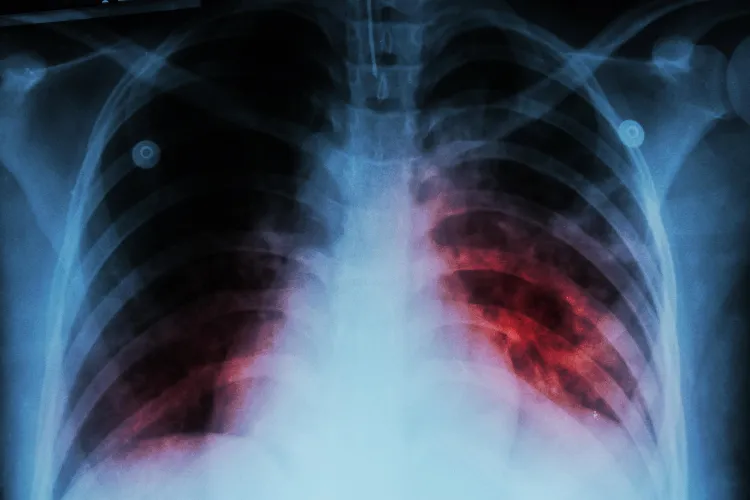
New Delhi
Puducherry's ten medical colleges are emerging as the leading units behind the Union Territory's TB elimination fight. They are contributing to more than 50 per cent of TB reports and participating in active case-finding efforts.
All ten medical colleges, three government medical colleges and seven private ones, have constituted Medical College Core Committee to implement and monitor TB elimination activities at their level, which include provision of diagnostic and treatment services, drug sensitivity testing, provision of TB preventive services, active case-finding survey and verification of claims for sub-national certification of TB elimination, Puducherry's TB Officer Dr C Venkatesh said.
"These institutions are working with the State TB Cell to identify vulnerable populations and map them as moderate or high risk. The mapped individuals are tested using highly sensitive tests, AI-enabled handheld chest X-rays and NAAT, molecular diagnostics," Dr Venkatesh said.
People with vulnerabilities, which predispose them to the disease, are identified in the database and are followed up with in the future case-finding drives as well, he said.
In 2023 and 2024, Puducherry was recognised as the best performing Union Territory across the South Zone in terms of diagnosing TB notification at medical college level.
Puducherry has 10 medical colleges for a population of 14,00,000 with an annual intake of more than 1500 medical students.
Medical colleges do not have a limited geographical area to cater to and being tertiary referral units, provide services to patients within the districts and from outside the district and state too, Dr S Govindarajan, Mission Director of National Health Mission (NHM), Puducherry, told PTI.
The State TB Office has been actively engaged with the medical colleges to ensure effective implementation of the medical college Task Force mechanism, he said.
"Medical colleges in Puducherry contribute to over 50 per cent of the all diagnosed TB cases in the UT mostly offering NAAT technology for diagnosis. They contribute to the majority of the extra-pulmonary TB cases diagnosed. They have implemented the differentiated TB care model by providing inpatient care to those who need it," Dr Venkatesh said.
In association with the department of community medicine in all the medical colleges, Puducherry had conducted an active case-finding survey for tuberculosis, wherein about 5.2 lakh individuals were screened at their door steps, around 42096 chest X-rays were taken and a 1432 sputum samples were collected, of which 25 individuals were identified to be suffering from tuberculosis.
Standardised paperless data capturing, public-private collaboration, AI-based screening by handheld X-ray device, deployment of upfront nucleic acid amplification testing (NAAT) for sputum, line list of vulnerable individuals available for periodic follow up and targeted interventions in reducing their risk, were novel practices that helped in successful implementation of this activity, said Dr Govindarajan.
As per the competency-based medical education curriculum for undergraduate students, the National Medical Council (NMC) had mandated all medical colleges to follow Family Adoption Programme (FAP), wherein a medical student adopts three to five families, once he joins the course and periodically follows them up till the completion of the course for holistic care.
"Medical colleges of Puducherry had utilised this opportunity to tap these medical students as a resource to screen the adopted family members for tuberculosis. The state supports this initiative by provision of sputum transport and diagnostic services. This first-of-the-kind model had been well received in scientific forums for its scalable nature and utilising of medical students as a manpower for screening for tuberculosis, given the backdrop of areas where there is scarcity of resources," Dr Govindarajan said.
Puducherry has been the first runner to complete both State-level NTEP Operational Research workshop as well as the State-level Training every year for Medical Colleges Task Force Mechanism to accelerate ending TB.
Following these, medical colleges in the Union Territory have been conducting periodic cascade training for various cadres of health care workers such as faculties, junior residents, interns and staff nurses. Puducherry State Task Force had also released a Standard Operating Procedure (SOP) for submission of operational research proposals to NTEP in the operational research workshop.
Medical colleges of Puducherry had also supported the 100 days' TB campaign of central TB division by conducting awareness sessions in the form of street plays, flash mob dance, face painting, health talks in the community as well as health facility. NMC also advises for elective postings for medical students, wherein students opt for elective modules of their choice in their desired subject.
Students who had opted for tuberculosis elimination activities supported the campaign by devising unique models for sensitising the community on respiratory hygiene and flipcharts regarding importance of nutrition in tuberculosis, Dr Govindarajan said.
ALSO READ: Farah Shaikh is behind lifting of unspoken ban on women's entry into mosques
The support of medical colleges in elimination of tuberculosis in Puducherry has been well appreciated in various forums for which the Puducherry State Task Force had twice consecutively been awarded as the best performing State Task Force at the Zonal level review meeting by the central TB division, Dr Govindrajan said.
